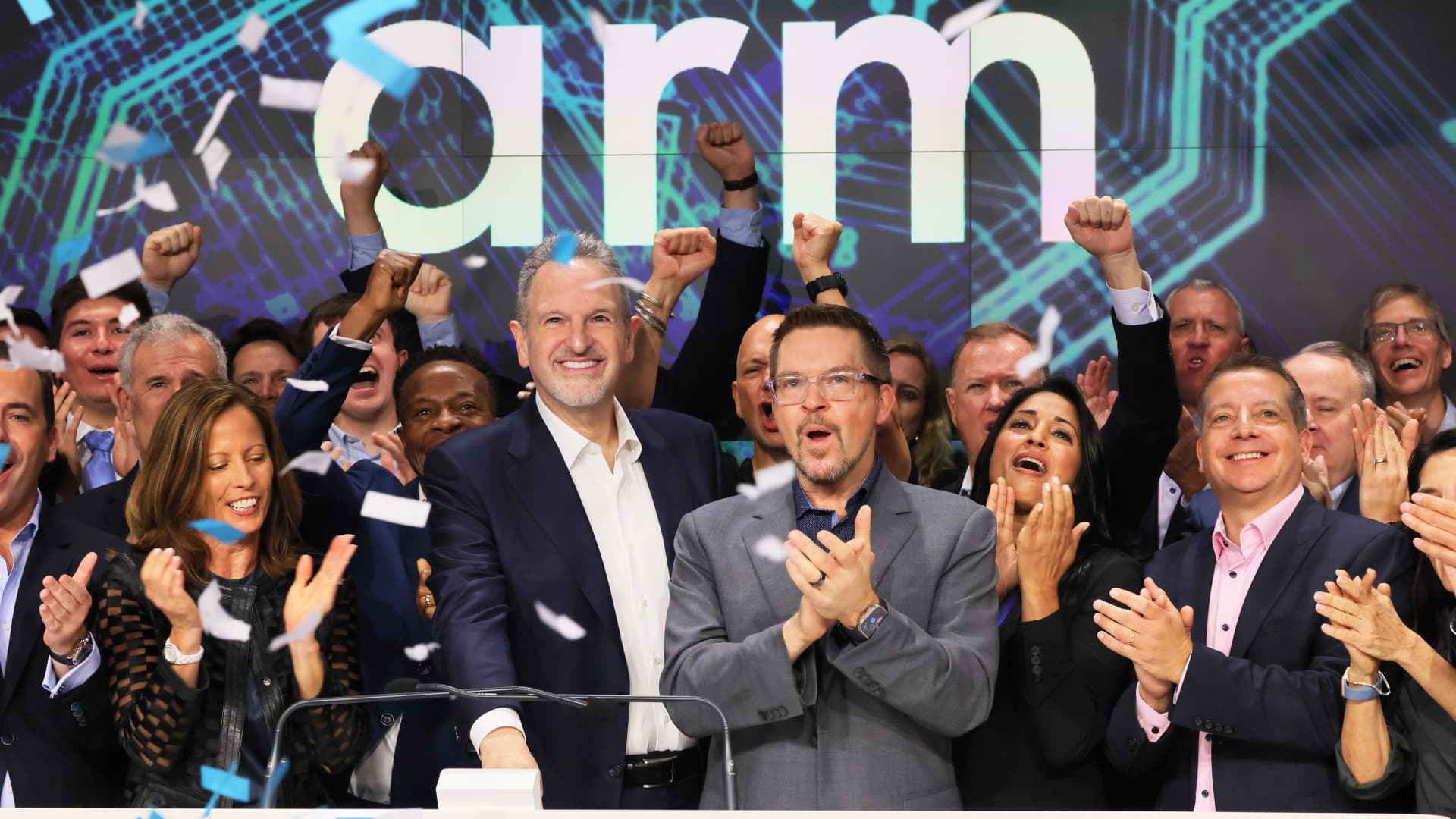Arm Holdings CEO Rene Haas rings the Nasdaq opening bell at the Nasdaq MarketSite on September 14, 2023 in New York City.
Michael M. Santiago | Getty Images
This report is from today’s CNBC Daily Open, our new, international markets newsletter. CNBC Daily Open brings investors up to speed on everything they need to know, no matter where they are. Like what you see? You can subscribe here.
What you need to know today
Tempestuous Tuesday
The Dow Jones Industrial Average fell Tuesday after the latest home sales and consumer confidence reports stoked concern over the state of the U.S. economy. The Dow lost 388.00 points, or 1.14%, to 33,618.88 in its worst day since March. The 30-stock index closed below its 200-day moving average for the first time since May. The S&P 500 fell 1.47% to 4,273.53, and closed below 4,300 for the first time since June 9. Meanwhile, the Nasdaq Composite shed 1.57% to close at 13,063.61.
Higher, not just longer
JPMorgan Chase chief executive Jamie Dimon has warned interest rates could go up quite a bit further as policymakers face the prospects of elevated inflation and slow growth. “I am not sure if the world is prepared for 7%,” he told The Times of India in an interview. Minneapolis Federal Reserve President Neel Kashkari sees a 40% chance of “meaningfully higher” interest rates. These comments come less than a week after Fed officials, in their quarterly economic update, indicated they could approve another quarter percentage point increase by the end of the year before beginning to cut a few times in 2024.
Dimon says
Still, the biggest risk is not higher interest rates — Dimon said it’s geopolitics. “Far more important to me is the Ukraine war, oil, gas, food migration — it’s affecting all global relationships — very importantly, the one between America and China,” he told CNBC-TV18 in another interview. As a result, he claims India optimism is “completely justified” and it’s not just because investors are looking for China alternatives.
Alibaba unit IPO
Alibaba plans to list its logistics unit Cainiao in Hong Kong, the Chinese e-commerce giant said in a regulatory filing on Tuesday. It’s the first to announce listing plans after one of the most radical shake-ups in Alibaba’s history. The company split its structure into six business units, and hopes most of them will be able to raise outside funds and go public.
[PRO] How to play Amazon
The Federal Trade Commission is accusing Amazon of illegally maintaining “monopoly power” to artificially raise prices, degrade quality for shoppers and stifle competition. CNBC Pro looks at the possible positions to take after the e-commerce giant shares slumped 4% Tuesday on this development.
The bottom line
With the economic outlook looking uncertain, will technology names continue to be the gift that keeps on giving?
Financial markets have gone into a tailspin as U.S. Treasury yields spiked since U.S. Federal Reserve Chair Jerome Powell said the Fed could approve another quarter percentage point increase by the end of the year before beginning to cut a few times in 2024.
The prognosis seems more dire, with JPMorgan Chase chief executive Jamie Dimon and Minneapolis Federal Reserve President Neel Kashkari adding to the bearish undertones Tuesday. Despite the Fed’s official guidance, they are suggesting that more interest rate hikes may be lurking.
Tech-related names, particularly those in the artificial intelligence space, have been some of the more eye-catching outperformers this year — so how do investors refine their thinking on the sector?
“We’re starting to think that the model of a successful tech company in 2023 … the optimal size is probably not that big,” Herman Narula, chief executive of the Softbank-backed virtual reality startup Improbable, told CNBC. “You probably want to be thinking about much smaller companies overall.”
Improbable said it reduced losses by 85% in 2022, a year that saw the company pivot its focus to powering new “metaverse” experiences. Narula said Improbable has managed to ship more products with fewer people, thanks to advances in generative artificial intelligence.
Will productivity gains be manifest in upcoming tech-related names?
Alibaba logistics unit Cainiao’s planned IPO in Hong Kong could attract robust interest simply due to its association with the Chinese tech giant and international growth. Alibaba has also previously said it hopes to list its cloud business, though nothing has been publicly announced yet.
Tech, with its inherent pioneering promise, is often thought to offer the best hope against the lack of clarity on the future. That may seem like the case in this moment, but it doesn’t hurt to look more deeply.

